


















BY DEAN GLEN SCHUMOCK
On September 13, 2024, 165 years after our founding, we officially ushered in a new chapter—and a new name. We are now officially the UIC Herbert M. and Carol H. Retzky College of Pharmacy.
As you will read in this issue of The Pharmacist, the new name honors the incredible legacy of support and impact by the Retzkys. Their total giving to the college exceeded $44 million. More importantly, that support has had, and will in perpetuity have, profound impacts on all areas of our mission. Most significantly, it will benefit pharmacy students by providing scholarships, new and extensive career development programs, and contemporary learning and research facilities.
The Retzkys’ support will be transformative for this school. In a time
when many pharmacy programs are struggling with enrollment and declining student outcomes, it provides the resources necessary to recruit the best and brightest students and to provide the tools necessary to ensure the most advanced curriculum and learning environment.
Change can be hard. This is a 165-year-old, top-ranked school of pharmacy with tradition and history that many hold dear. But that history, tradition, and pride is not going away. Rather, it is being made stronger. The UIC Retzky name will be synonymous with that history of excellence, innovation, and leadership in pharmacy but also with even greater expectations for the future—as the apex for pharmacy education, research, and service.

And this isn’t the first time we changed our name. In fact, we have had a long succession of names as we have transformed and Online
pharmacy.uic.edu
go.uic.edu/PharmFBChicago
go.uic.edu/PharmFBRockford
go.uic.edu/PharmTwitter
go.uic.edu/PharmLinkedIn
go.uic.edu/PharmInstagram
go.uic.edu/PharmYouTube
Change jobs? Get a promotion? Publish a paper? Publish a book? Get married? Have a baby? We want to hear about it all! Submit your updates at go.uic.edu/AddressUpdate
We’ll do our best to fit it into our publications and/or social media! If you don’t see it in The Pharmacist, please go to go.uic.edu/PharmNews.
adapted over time. We have been the Chicago College of Pharmacy (1859–1896); the University of Illinois School of Pharmacy (1896–1932); in 1917, we absorbed Northwestern University’s school of pharmacy (called the Illinois School of Pharmacy); the University of Illinois College of Pharmacy (1932–1961); the University of Illinois at the Medical Center College of Pharmacy (1961–1982); and the University of Illinois [at] Chicago College of Pharmacy (UIC, 1982–2024). After all these name changes, we are still here—the fifth oldest school of pharmacy in the country. Stronger than ever.
Welcome to the UIC Retzky College of Pharmacy.
The University of Illinois Chicago Retzky College of Pharmacy Office of Continuing Education and Meeting Services (OCEMS) offers continuing education courses for pharmacists, pharmacy technicians, and pharmaceutical representatives. See the full list of our continuing education opportunities and events at ce.pharmacy.uic.edu
PHARMACY TECHNICIAN CE PROGRAMS
10+ ACPE-approved pharmacy technician continuing education programs are available. For more information, please visit ce.pharmacy.uic.edu/ce/pharmtechs.
PHARMACIST CE PROGRAMS
30+ ACPE-approved pharmacist continuing education programs are available. For more information, please visit ce.pharmacy. uic.edu/ce/pharmacist.
PHARMACEUTICAL REPRESENTATIVE PROGRAMS
Pharmaceutical representative continuing education programs are available for the City of Chicago and the State of Oregon. For more information, please visit ce.pharmacy.uic.edu/ce/ pharmaceutical-representatives
CHICAGOLAND CRITICAL CARE CONFERENCE
Save the Date! Please join us for the 10th annual Chicagoland Critical Care Conference to be held at the UIC Retzky College of Pharmacy on Saturday, August 23, 2025.
Our Digital Edition
issuu.com/uicpharmacy
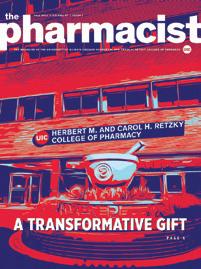
Dean Glen Schumock was among the experts testifying to state lawmakers about an expanded scope of practice for pharmacists. State lawmakers approved legislation to allow pharmacists to independently test and treat several aliments, including flu, COVID-19, strep throat, RSV, and lice. The benefit of this is that patients can be tested and receive treatment by a pharmacist without delays that are common in other parts of the healthcare system. Schumock said that “pharmacists are highly trained and very capable of doing more to meet the needs that patients have but often can’t receive because of limited access to other providers. Legislation like this a step in the right direction, so that patients can get convenient and affordable care.”
Awards, Appointments, and Certifications
Paul Carlier and Zongmin Zhao were both granted a Chancellor’s Translational Research Initiative (CTRI) award.
Dr. Pavel Petukhov was granted a Chancellor’s Translational Research Initiative (CTRI) award.
Dr. Scott Benken graduated from the AACP Academic Leadership Fellows Program.
Dr. Taylor Watterson was selected for the University of Illinois System’s Public Voices Fellowship.

Beth Woods was selected to serve on the Board of Directors of Region IV of the National Council of University Research Administrators.
Dr. Cele Abad-Zapatero was selected for a 2024 American Crystallographic Association Fellowship.
Dale Rush was awarded the AACP AFO-SIG 2024 Excellence in Leadership Award.
Zackery Bulman, PharmD, was promoted to associate professor with tenure in the Department of Pharmacy Practice.
professor in the Department of Pharmaceutical Sciences.
Irina Gaisina, PhD, was promoted to research professor in the Department of Pharmaceutical Sciences.
Alice Hemenway, PharmD, MPH was promoted to clinical associate professor in the Department of Pharmacy Practice.
Jeffrey Mucksavage, PharmD, was promoted to clinical associate professor in the Department of Pharmacy Practice.
professor in the Department of Pharmacy Systems, Outcomes, and Policy.
Andrew Riley, PhD, was promoted to associate professor with tenure in the Department of Pharmaceutical Sciences.
Rosalyn Vellurattil, PharmD, was promoted to clinical professor in the Department of Pharmacy Systems, Outcomes, and Policy.
Lori Wilken, PharmD, was promoted to clinical associate professor in the Department of Pharmacy Practice.
Awards, Grants, Fellowships, and Scholarships
Mrinmayee Joshi was awarded the UIC Graduate College Award for Graduate Research.

Angeliki Andrianopoulou received the 2024 Chicago Consular Corps Grant.

Kent Hanson was awarded the UIC Dean’s Scholar Fellowship from the UIC Graduate College.
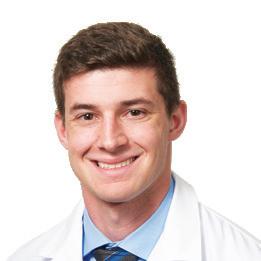
Sonia Alavi, Nivida Shete, and Jane Miglo each received the Award for Graduate Research.
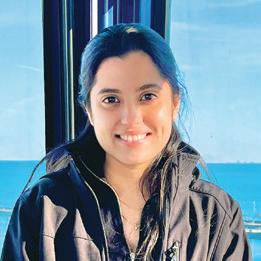
Luke Harding and Destiny Durante are recipients of the American Foundation for Pharmaceutical Education (AFPE) 2024–2025 Predoctoral Fellowships in Pharmaceutical Sciences.
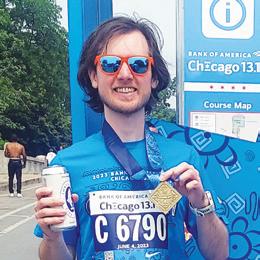

Chao received the Government Scholarship to Study Abroad (GSSA) from the Ministry of Education of Taiwan.
Mohammad Abdallah was selected as a distinguished Schweitzer Fellowship.
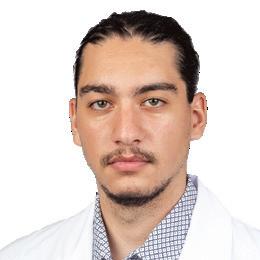
Poster Awards and Appointments
Asia Banks was selected for the Scientist Mentoring and Diversity Program (SMDP).
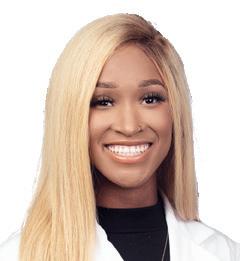
Kanya Shah started her term as chair of the ISPOR Student Network.
Sun Choi won the Best Graduate Student Poster award from the AMCP Foundation.
Dahee Jung won a poster award at the Dr. Gary Kruh Cancer Research.

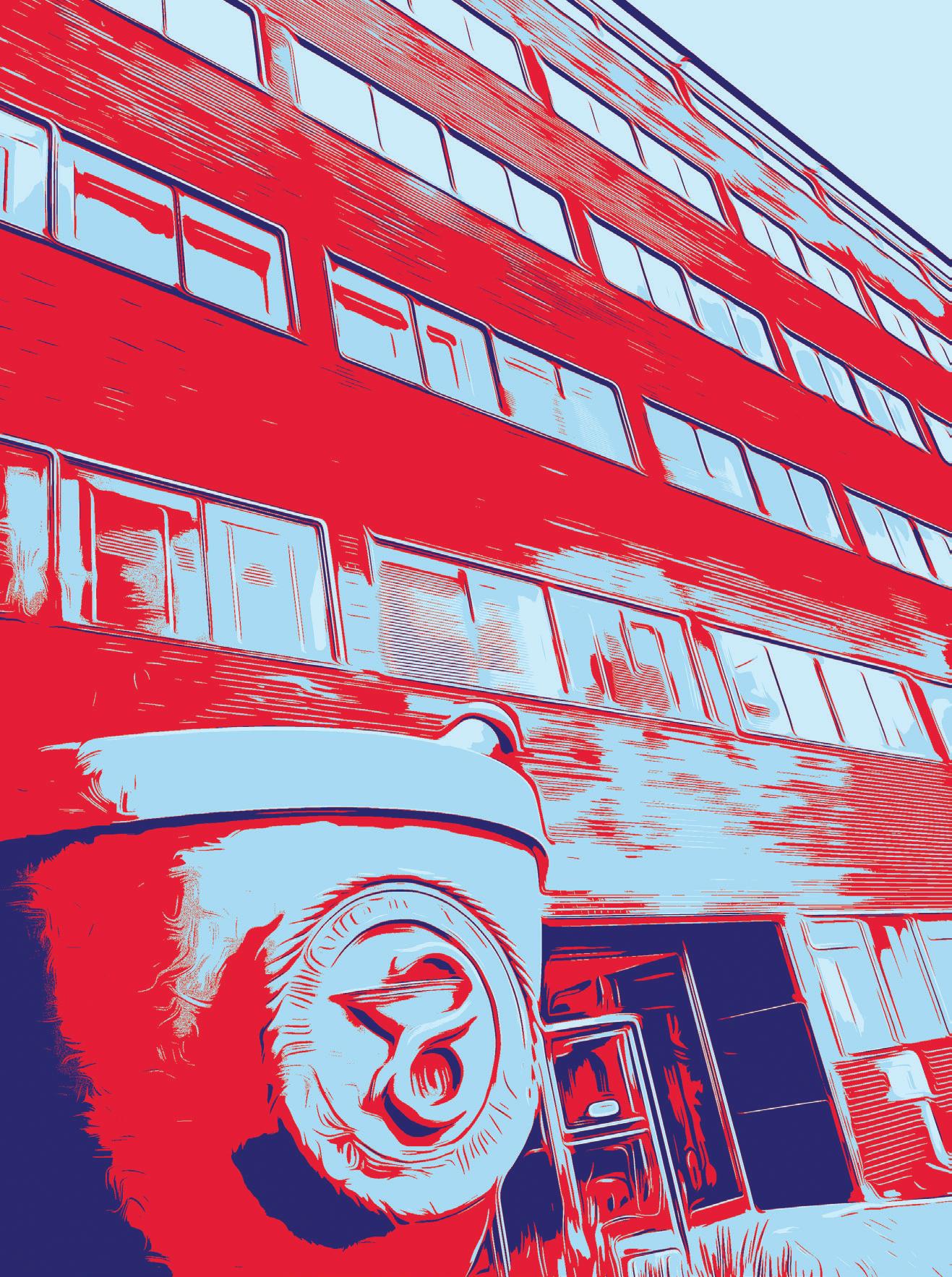
BY DANIEL P. SMITH
A $36 million gift from the estate of two longtime supporters gives the UIC College of Pharmacy a massive push—and a new name, the
Herbert Retzky, BS ’46, and his wife, Carol Retzky, HON ’19, were not flashy people chasing headlines and publicity, but it’s hard not to be wowed by the late couple’s substantial gift to the UIC College of Pharmacy.
After donating more than $8 million to the college over the previous two decades— an already impressive sum that made the Retzkys the college’s largest individual philanthropic donors—an endowment gift of an additional $36 million from the couple’s estate cements the Retzkys’
legacy for advancing pharmacy education at UIC and driving innovative careers in the field. Specifically, the couple’s latest gift will power perpetual programs for merit-based scholarships and career development initiatives at the college.
The couple’s collective gifts amplify the spotlight on UIC and the college, one routinely ranked among the nation’s top pharmacy schools.
“This certainly elevates the visibility of the college nationally while also providing the resources we need to make our future even brighter,” says the college’s dean, Dr. Glen Schumock.
To honor the Retzkys’ longstanding and significant support, the University of Illinois Board of Trustees approved the renaming of the college as the Herbert M. and Carol H. Retzky College of Pharmacy—or UIC Retzky College of Pharmacy for short. It represents the first donor-named college at UIC and only the fourth in the University of Illinois System. (Of note, the UIC Jane Addams College of Social Work is named after a historical figure rather than a donor.)

[THE RETZKYS] FELT THE COLLEGE OF PHARMACY AT UIC WAS A PLACE WHERE THEY COULD REALLY MAKE A DIFFERENCE.
“UIC’s mission is to provide the broadest access to the highest levels of educational, research, and clinical excellence,” UIC chancellor Marie Lynn Miranda says. “The Retzkys’ transformative gift accelerates our work to prepare UIC students to provide excellent and equitable care throughout the many communities that our graduates serve.”
LIFELONG TIES TO PHARMACY
Both children of pharmacists, Herb and Carol Retzky held deep ties to the profession. Married in 1952, the couple operated the pharmacy of Herb Retzky’s father on Chicago’s South Side before selling that business and purchasing Hale Drugs in Chicago’s Galewood neighborhood in 1957.


Over the next three decades, the couple ran Hale Drugs at the corner of North and Oak Park Avenues. While Herb Retzky expertly played the role of the community-oriented pharmacist dispensing medications and sage counsel, Carol Retzky, an energetic and extroverted counter to her husband’s more reserved demeanor, served as the establishment’s pharmacy technician and bookkeeper.
“They were in their store all the time and enjoyed being accessible to anyone who walked through the door,” says Elaine Levin, who first met the couple when she was in kindergarten and now serves as trustee of the Retzkys’ estate trusts. “Herb, in particular, was very interested in promoting the pharmacy profession, and he took that seriously.”
Herb Retzky, in fact, constantly sought new knowledge and established touchpoints with his alma mater to remain connected to pharmacy training and the field’s continued evolution. For instance, he attended a continuing education program on infectious diseases hosted by College of Pharmacy faculty for 25 consecutive years and also served as an alumni representative on several committees at the college, including groups evaluating courses and steering curriculum.
“Herb was someone who loved learning, and being involved with the college was one way he learned more,” says longtime College of Pharmacy faculty member Dr. Larry Danziger, who first interacted with Herb Retzky in the late 1980s when the two served together on an educational policy committee at the college.
Outside of their independent pharmacy, Herb Retzky was an avid photographer and Carol Retzky sang in community choral groups. Both, however, enjoyed studying the stock market, hand-charting stocks and devouring books on investing long before big data and institutional trading became mainstream. They generated their wealth through their separate, wellresearched, and long-term investments in the stock market, which enabled the Retzkys to activate their inherent philanthropic spirit.
“They devoted their life to pharmacy, and they believed in advancing the profession,” Levin says. “Even more, they felt the College of Pharmacy at UIC was a place where they could really make a difference.”
The River Forest couple first donated to the College of Pharmacy in 2003, bestowing $50,000 to launch two scholarships: one in their name and the second to honor the memory of Lester Weitzman, one of Herb Retzky’s College of Pharmacy classmates.
But that was only the beginning.
In 2012, the couple established the Herbert M. and Carol H. Retzky Endowed Chair in Pharmacy Practice with a $2 million gift. Four years later, they converted that gift into the Herbert M. and Carol H. Retzky Deanship with an additional $3 million commitment. At the time, the Retzkys’ $5 million pledge was the largest gift in the history of the college, the first deanship established at UIC, and only the third deanship in the entire University of Illinois System.
“The Retzkys were a very altruistic couple and simply wanted to help the college,” says Dr. Jerry Bauman, who got to know the Retzkys well during his decade-long run as dean of the college (2007–2017). “They were proud to be in the pharmacy profession and proud to be involved with a college that had such a strong national and international reputation.”
After Herb Retzky passed away in 2017 at the age of 93, his wife of 65 years continued supporting the college. In 2018, she donated $1 million to build the Herbert and Carol Retzky Simulation Center at the college’s Wood Street location. Since its 2019 opening, the contemporary, state-of-the art space has provided

THE RETZKYS’ TRANSFORMATIVE GIFT ACCELERATES OUR WORK TO PREPARE UIC STUDENTS TO PROVIDE EXCELLENT AND EQUITABLE CARE THROUGHOUT THE MANY COMMUNITIES THAT OUR GRADUATES SERVE.
hundreds of pharmacy students hands-on training in dispensing medications and counseling patients while also doubling as an events space and popular afterhours study space for students.
Then, in 2019, months before she passed away at the age of 90, Carol Retzky committed $2 million as the
THANKS TO THE RETZKY’S GENEROSITY, the Retzky Simulation Lab has greatly improved the student experience here at the college, especially around engagement and educational opportunities. Not only does the lab serve as a collaborative space to engage in active learning, but it also serves as a quiet space for students to meet and study together.
KATHRYN M. SAWYER , PharmD, MBA, BCACP, CAPM Coordinator of the Patient Care Skills Lab, Clinical Assistant Professor
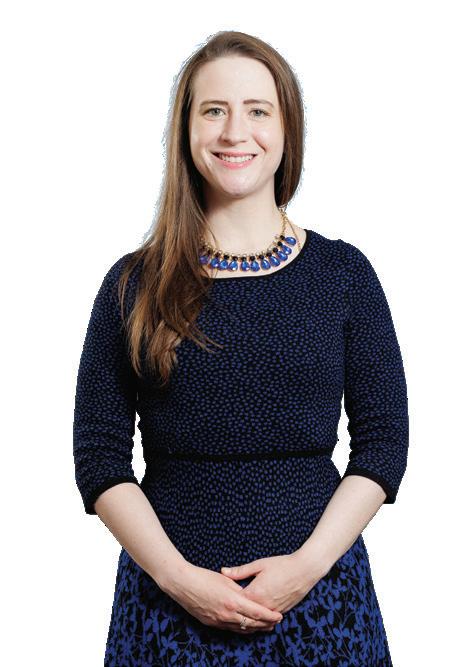
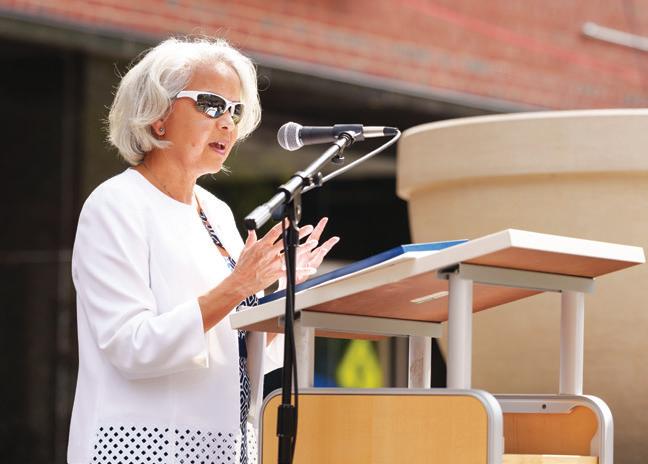



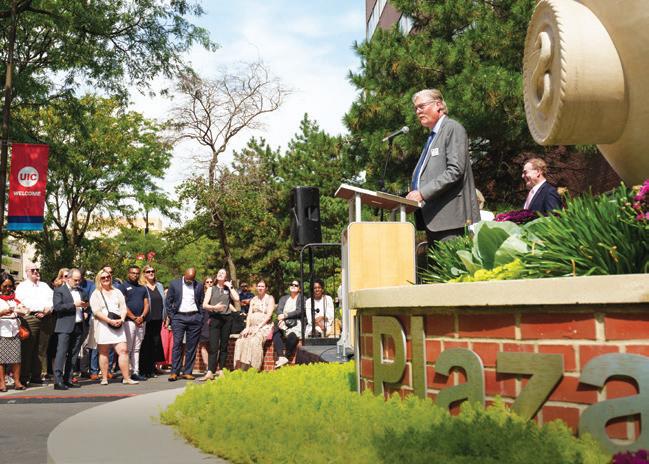
UNVEILING CELEBRATION
SEPTEMBER 13, POZEN PLAZA
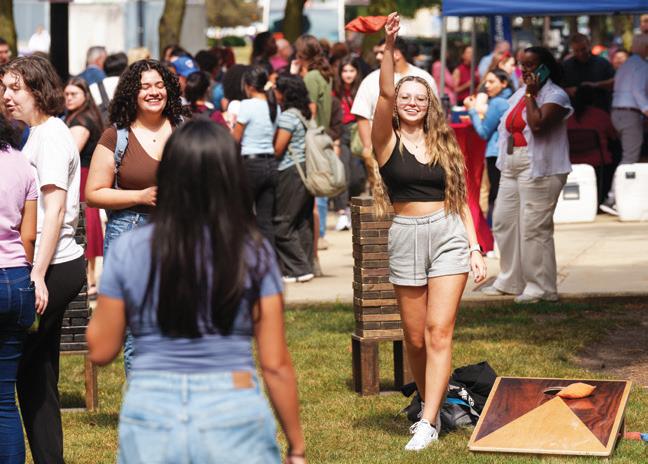
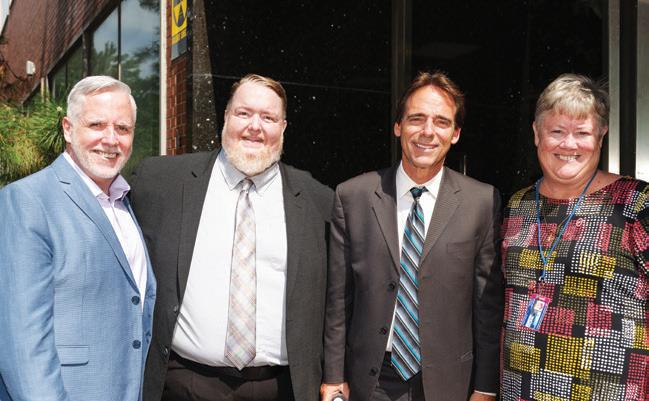
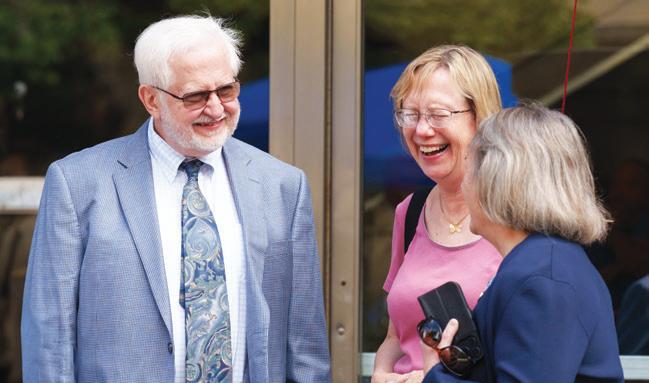
leading private gift to help fund the planned Drug Discovery and Cancer Research Pavilion. The still-indevelopment public-private effort has been thoughtfully designed to fuel collaboration, research, and the advancement of new therapies.
“The Retzkys wanted to support the college in all aspects, and they appreciated the opportunity to impact the college and its students,” Schumock says.
As the couple designated the UIC College of Pharmacy as the largest beneficiary of their estate, Levin, a California-based attorney, inherited the task of carrying out the Retzkys’ wishes.
When Levin first sat down with Schumock to discuss the gift, she mentioned the couple’s foremost aim was to make a transformative difference at the college.
Together, she and Schumock reviewed the college’s strategic plan and selected projects that would advance the college and, specifically, the student training and professional development efforts the Retzkys so prized.
Eighty percent of the endowment funds are earmarked for merit-based scholarships, a focused attempt to attract the brightest and most committed pharmacy students to UIC. The Retzkys’ generosity raises the amount of current merit scholarships at the college from approximately $200,000 each year to well over $1 million.
The remaining 20 percent, meanwhile, will fund career development initiatives for students. This includes resources to help students enter the profession and activities to increase successful outcomes, which range from placement resources to student-alumni engagement programs exposing students to innovative careers in the profession.
“The university’s academic health enterprise is extraordinarily grateful for the Retzkys’ significant philanthropy, which will continue to expand our scholarship and training opportunities for the pharmacy profession,” vice chancellor for health affairs Dr. Robert Barish says. “This investment will benefit future

generations of learners and reflect the common legacy of UIC and the Retzkys to serve the needs of our local community and the state.”
Schumock, meanwhile, calls the Retzkys’ gift “profoundly transformative” for the college. It promises to elevate the caliber of pharmacy students attending UIC and bolster key metrics at the college, from licensure scores to national rankings. Yet more, it strengthens the professional pipeline for pharmacists, addressing a national need for professionals who can deliver high-quality care.
“The resources this gift will generate annually will significantly transform the college, creating opportunities for students, preparing them for success in the field, and driving massive downstream benefits,” Schumock says. “Above all, Herb and Carol wanted to help people and help the profession, and their gifts will help so many students and future pharmacists.”
Herb Retzky once said he and his wife “wanted to provide something that extends beyond our own time here on Earth.” Levin believes this final, enduring gift honors their philanthropic ambitions, as well as their passion for UIC and the pharmacy profession.
“The Retzkys were a private couple who weren’t much for publicity, and while they’d shy away from the attention here, I do believe both Herb and Carol would be extremely pleased with their legacy of what this transformative gift can accomplish for the College of Pharmacy, its students, and the profession,” Levin says.


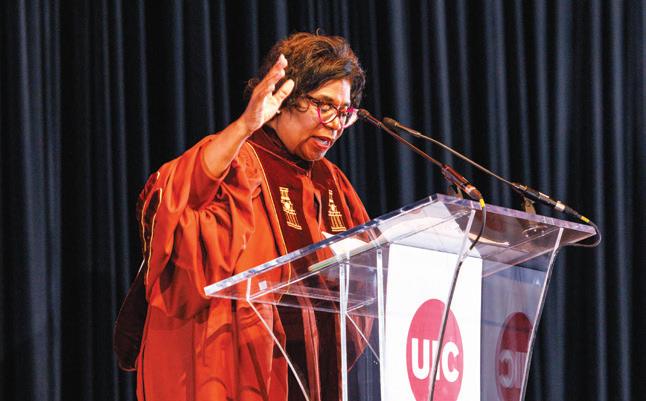
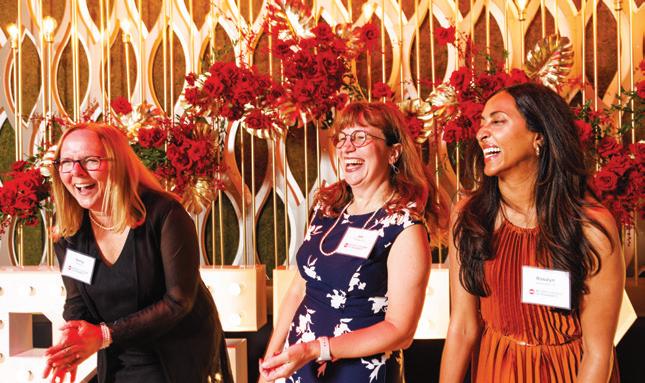

In 2016, thanks to a $5 million donation, Herb and Carol Retzky established the Herbert M. and Carol H. Retzky Deanship. At the time, the Retzkys’ $5 million pledge was the largest gift in the history of the college, the first deanship established at UIC, and only the third deanship in the entire University of Illinois System.
At the time of the gift, Herb Retzky said, “We wanted to provide something that extends beyond our own time here on Earth, and we found that a gift to the College of Pharmacy would seem to fulfill the ambitions we had. We're grateful that we have been given the chance to assist the college."
On September 13, the college was finally able to realize and celebrate that gift with the formal investiture of Dean Glen Schumock as the first Herbert M. and Carol H. Retzky Dean.
“Being the Retzky Dean is something I will really cherish,” Schumock said during his investiture ceremony.
“I realize being in the right place at the right time was key to this, and I feel very fortunate for that. I am certainly not the only dean of pharmacy that knew the Retzkys. Three emeritus deans are here tonight—Drs. Henri Manasse, Rosalie Sagraves, and Jerry Bauman. They all knew the Retzkys, and they helped establish the relationship that led to this evening.”
“There will be many great deans of this school in the future, deans who are recruited by the existence of this deanship and by the stature of this school—the Retzky College of Pharmacy. The quality of that leadership will lead to even greater accomplishments and success. So, with this deanship, the Retzkys have set in motion an incredible future.”
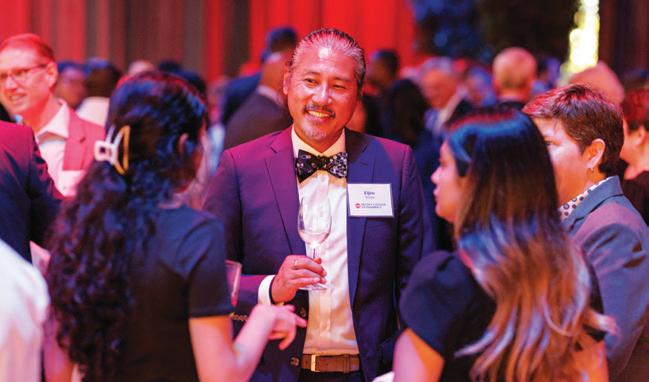
BY LAURA HAYES
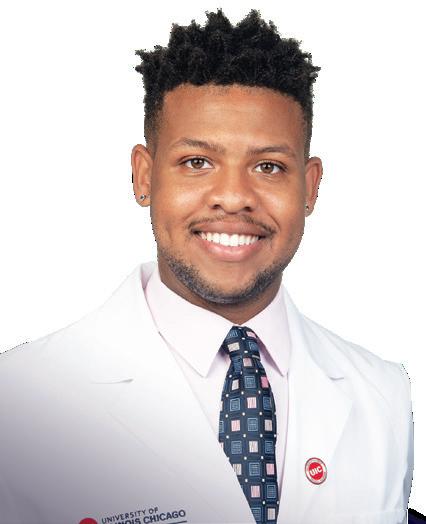

Every student pharmacist at UIC is involved in some sort of extracurricular volunteer activity or community service work, ranging from health screenings and pharmacy education activities to local cleanup days and volunteering at soup kitchens. From the beginning of their P1 year, UIC student pharmacists are encouraged to develop skills to enhance their relationships with the local community through service to make them not only better pharmacists, but also better people.
Their active engagement in service work on top of their academic commitments reflects their dedication to being well-rounded and effective pharmacy leaders who want to make a positive change in their world. Here are just a few of our students who have made it their mission to connect with and to serve their local communities.
Alden Williams, P3 student pharmacist in Chicago, volunteers every week on the South Side of Chicago at the Boxville Marketplace, where he gives free blood glucose tests and blood pressure screenings to local community members. Alden is part of the UPHARM program, which is designed to introduce students to issues specific to urban public health and primary care practice. In addition to his work at the Boxville Marketplace, he volunteers at various races, and this
past summer, he contributed to the AIDS memorial garden in Chicago.
“One of my favorite moments from volunteering at Boxville is seeing how motivated the people are to take control of their health,” he says. “It’s truly inspiring to witness how much they care about their well-being and are proactive in seeking guidance.”
Williams also recognizes how important these experiences are for becoming a better pharmacist.
“By interacting with diverse populations, students can improve their communication skills, cultural competence, and understanding of different health challenges,” he says. “Pharmacists being involved in their local communities is essential. It helps build trust and fosters a deeper understanding of the unique health needs of the community. Community service has positively impacted me by improving my cultural competency and helping me understand and empathize with different groups, which ultimately makes me a more effective pharmacist.
Raquel M. Ortiz-Merced, P4 student pharmacist in Rockford, gives free blood pressure screenings at county fairs and offers flu clinic immunizations and medication


counseling to the local Rockford community. She is also involved in educating elementary school students so they can learn about the field of pharmacy. She participates in local cleanups, such as at the Camp Winnebago YMCA of Rock River Valley.
“It’s important for pharmacy students to be involved in community service because it provides you with exposure to different patient populations, backgrounds, and perspectives,” she says. “It also teaches you to work as a team with different people for a common good. Community service gives student pharmacists the opportunity to improve their soft skills such as leadership, effective communication, and empathy. And as a Latina, being able to connect with the Spanish speaking population and identify their excitement when they get to ask me questions and clarify concepts about healthcare has been one of my favorite experiences.”

Austin Flemming, P3 student pharmacist in Rockford, is part of the RPHARM program and is involved in many activities related to rural pharmacy outreach. He has helped lead pharmacy camps for high school and elementary school students, volunteers at his church’s soup kitchen, and participates in 4-H career days and blood pressure clinics at local county fairs.
“Whether it is providing medical advice at community events or even just lending a hand to a homeless shelter, we as student pharmacists can receive many benefits from service, including stronger interpersonal skills, as well as find joy in knowing your impact has helped others,” says Flemming. “It is important for pharmacists to be involved in local communities because we can provide services and advice that help managing health run smoother for everybody. I also believe the general public often underestimates the value of a pharmacist, so being involved in local communities helps demonstrate what we can offer as healthcare professionals.”
Lexi Terris, P3 student pharmacist in Chicago, volunteers at the Boxville Marketplace and the IMD Guest House, which provides comfortable, affordable accommodation for patients and their families going through medical treatment. She is involved in UIC’s Narcan training and distribution program on campus and in the Chicago community. In addition to being a volunteer, she also organizes many of these events.
“My favorite memory from my work with the local community is when I hosted a bingo night with help from
Volunteering in underserved communities is especially important as these communities may not get the same quality of care.
When it feels like your efforts are small, trust that they will still have an impact on others.
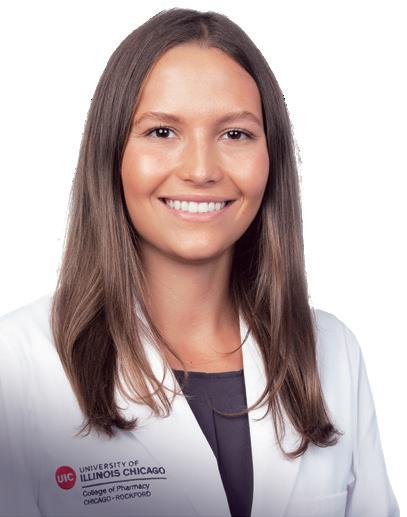

my Phi Delta Chi brothers at Guest House. The guests are very competitive, so it was a really fun atmosphere and very rewarding being able to hand out the prizes we fundraised for.”
She says her frequent interactions and relationships developed from her service work have helped her feel like a more effective healthcare provider.
“Since being a pharmacist is one of the most trusted professions, it is essential to have connections with the community,” she says. “By doing this work, we pharmacy students are able to experience the direct impact they can have on their community beyond the pharmacy counter. There are people who face barriers to healthcare that rely on the outreach efforts of pharmacists and other healthcare providers to have their questions and needs met. It helps the community develop trust when they can make connections with their pharmacist.”
“Participating in community service has taught me that while a service or interaction might seem insignificant to me, it might mean a lot to someone else,” she says. “So, even when it feels like your efforts are small, trust that they will still have an impact on others.”
DESIREE ARIRIERI
Desiree Aririeri, P3 student pharmacist in Chicago, is another UPHARM student who volunteers at Boxville Marketplace. Every week, she takes blood pressure screenings next to a vegetable food truck and provides
a casual, low-pressure environment for patients to take their blood pressure and talk about their health.
“Volunteering is important because you get real life experience with patients in an environment that school alone may not be able to prepare you for,” she says. “Volunteering in underserved communities is especially important as these communities may not get the same quality of care as other people in different zip codes. You get to hear these experiences firsthand and help in your own way bridge the gap. My favorite memory is when I was able to give a free blood pressure monitor to a young man. He was so happy, you could see the tears in his eyes.”
“I thought I understood the health inequities in this area, but to see it firsthand is humbling. I believe it will help me better understand the needs of my patients as a future pharmacist.”

You are invited to the 15th Annual Research Day
hosted by the UIC Retzky College of Pharmacy
Friday, November 1, 2024!
This year’s keynote speaker will be Dr. James J. Moon, J. G. Searle Professor, Departments of Pharmaceutical Sciences, Biomedical Engineering, and Chemical Engineering at the University of Michigan.
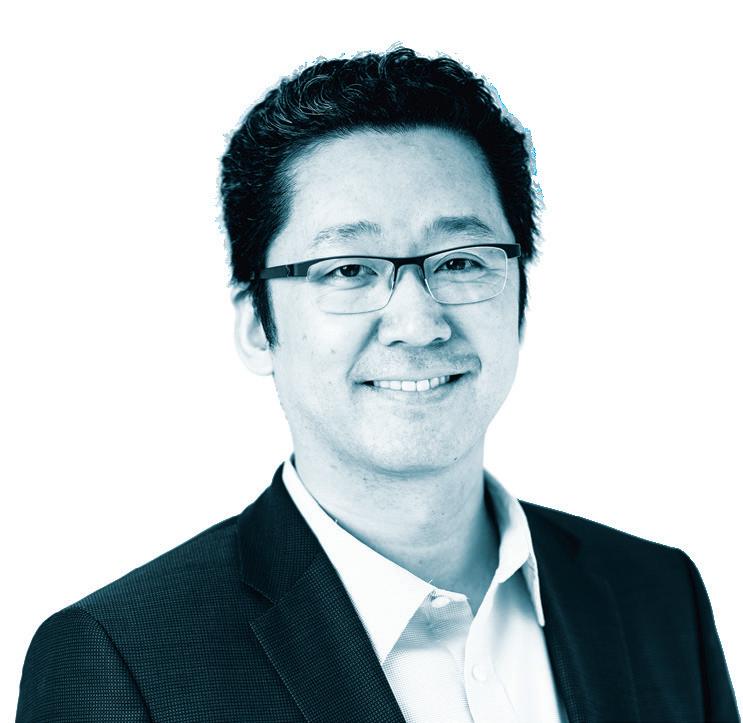
POSTER SESSIONS
10:00–11:15 a.m. and 11:15 a.m.–12:30 p.m.
Retzky College of Pharmacy Building / Chicago / Suite 2N
LIGHTNING TALKS / KEYNOTE LECTURE / AWARDS CEREMONY
Retzky College of Pharmacy Building / Chicago / Room 134-1
CALL FOR JUDGES
If you’re able to help out by judging posters, we’d love to have you. RSVP to Lindsey McQuade (lmcquade@uic.edu) by Friday, October 18, 2024.
FOR MORE INFORMATION
Please visit researchday.pharmacy.uic.edu or contact Lindsey McQuade (lmcquade@uic.edu) with questions.

BY JESSICA CANLAS

amdin Useini had never seen a patient
Not until his APPE rotation in emergency medicine at OSF St. Anthony Medical Center, where he witnessed a patient go into cardiac arrest—and experienced the resulting interventions—on his second day.
“I was in a state of shock,” recalls Useini, P4 at the UIC Retzky College of Pharmacy in Rockford. “Seeing something with your own eyes versus learning about it in lecture—there’s no comparison for
Witnessing how patients are treated in that setting, however, was strong reinforcement of what he had learned in the classroom, he says.
Since high school, Useini, a Rockford native, had an interest in pursuing a
NOT
OFFER UIC STUDENTS A LARGE SPECTRUM OF EXPERIENCES, THOSE OPPORTUNITIES ARE SPREAD THROUGHOUT ILLINOIS.

“It’s an area where you can make interventions on patients’ behalf that sometimes can be overlooked by doctors,” he explains. “Doctors can be so focused on a diagnosis that they might not optimize medication therapy as well as they could.
“They don’t have that deep pharmacological, pharmacokinetic knowledge.”
During his rotation at OSF St. Anthony, Useini sought after just that, while taking the opportunity to apply what he already knew to the high-stress, maximum-intensity environment that keeps emergency room practitioners on their toes.
“Seeing the spectrum of acuity was eye-opening,” he says. “I think it helped me to understand more about myself—what I can handle and what I can’t, where I need to improve to handle certain situations better.” In the end, Useini walked away with the confirmation that emergency medicine is an area of interest for him.
He admits that his eureka moments wouldn’t have been the same without the guidance of a skilled mentor. In his case, that was clinical assistant professor Marianne Pop.
“My preceptor was amazing,” he says. “She always set aside time to take teaching moments out of everything no matter what was happening.”
Since she joined OSF St. Anthony, Pop has been mentoring students and residents as UIC’s resident faculty member in the emergency department. Back in 2009, when the Rockford campus opened its doors, the longstanding partnership between the two institutions was further cemented with the introduction of resident faculty at OSF St. Anthony. Pop, who became the second UIC faculty member to assume that position in 2015, serves as emergency medicine clinical pharmacist and eventually led the establishment of that department’s pharmacy residency program.
“I knew I wanted to work somewhere at a place where I could basically consolidate my passions–emergency medicine and teaching,” says Pop, who, though she was born and raised in Miami Beach, claims she moved north “for the cold weather.” During her PGY2 residency at Tampa General Hospital, she had the opportunity to witness the behind-the-scenes of establishing a residency program, and decided that was also something she wanted to be a part of in her professional career.
Although she acknowledges that the proximity of the Rockford campus and OSF St. Anthony plays a part in driving that relationship, she has observed a more profound synergy over the years.
“Ever since I started here, the biggest thing I noticed was how the community here at the hospital, including the patients, accepted me right away, knowing that I worked for UIC. So what we have to offer is not only providing care, but also an educational component.”
Pop recalls an occasion when she worked with stakeholders at UIC and a staff team at OSF St. Anthony to apply for a mutually developed grant for the emergency medicine department.
“It was nice to see how both sides were really interested in helping the community. Everyone came together in an effort to advance patient care.
“Even though they are two separate institutions, they really have the same vision in mind.”
Although the most obvious illustration of the relationship between the college and OSF HealthCare may exist in Rockford, that is just one of OSF HealthCare’s extensive network of locations in Illinois, and the partnership between the two organizations spans numerous sites throughout the state.
Headquartered in Peoria, OSF HealthCare is a largescale health system comprising 16 hospitals with more than 2,000 licensed beds, 39 urgent care locations, and two colleges of nursing throughout Illinois and Michigan. The organization also includes a homehealth division, a foundation, and even a venture capital arm, which provides funding for promising healthcare innovation startups.
“What’s unique about what OSF has to offer is its broad reach within the state,” says Allison Schriever, clinical assistant professor and director of experiential education at the Rockford campus. “It has large and small facilities, with locations that have an academic center feel, as well as small, critical access hospitals in rural areas with 24 beds and one pharmacist.”
Not only does OSF HealthCare offer UIC students a large spectrum of experiences, those opportunities are spread throughout Illinois, including locations in Ottawa, Mendota, Galesburg, Peoria, and Evergreen Park, to serve the interests of a greater selection of students, as well as a widely varied patient population.
Kevin Rynn, vice dean at the Rockford Campus, feels that the OSF health system as a whole is invaluable to the college. “We partner with quality healthcare institutions like OSF to educate and execute our curriculum, so they’re imperative in the success of the campus and our graduates.”
The relationship between the institutions also includes the University of Illinois College of Medicine, and a number of OSF locations offer training for rural education programs in both pharmacy (RPHARM) and medicine (RMED).
“In my experience, OSF has always been willing to think outside the box, to be different and innovative, for the benefit of both students and patients,” says Schriever.
OSF also employs a number of UIC Pharmacy alumni with whom students can discover mentorship opportunities and begin building their professional networks.
“OSF is a vital contributor to our educational program,” says Dean Glen Schumock, “especially with St. Anthony, which is located close to our Rockford campus. But it’s also statewide because of its larger footprint. We benefit by being able to place students in all those other locations as well.”
Together, Sandy Salverson, PharmD ’96, senior vice president of pharmacy services, and Kyle Shick, PharmD ’07, vice president of pharmacy operations, oversee OSF’s entire division of pharmacy services. They are also UIC Pharmacy alumni who serve as examples for the next generation of pharmacists while shaping the future of the profession—and improving the quality of healthcare in the state of Illinois.
“We wouldn’t be able to do those things if UIC wasn’t providing that quality educational foundation,” she says. “The caliber of students we see is reflective of that.”
Sam Fordjour, PharmD ’24, who was born and raised in Ghana, was halfway through pharmacy school in his home country when his family relocated to the United States, and he had to restart his pharmacy education at UIC.
Despite his disappointment at having to start over, Fordjour commented, “If you already have your mind set on what you want to do, you just have to focus and get the job done.”
He so enjoyed his P2 IPPE experience at OSF St. Anthony with Pop that he returned during his P4 year for another rotation with her for his APPE.
“Once you get to OSF, they match your energy depending on what you’re actually looking for in your rotation,” says Fordjour. “You have to tell them your objectives for the time you’re going to spend with them, what you’re looking to get out of it.”
STUDENTS AND PATIENTS.
With his sights on leadership, he decided to pursue a rotation in administration to discover what the “other side of pharmacy” looked like.
After that, Fordjour sought to understand the inner workings of the hospital’s outpatient pharmacy and completed a rotation in retail with Que Mohring, PharmD ’98.
Mohring helps oversee the hospital’s Meds to Beds program, which she helped launch close to seven years ago when she joined OSF St. Anthony as a staff pharmacist.
Like other similar programs, OSF St. Anthony’s Meds to Beds provides an essential service in the patient recovery process by delivering discharge medications to the bedside and providing counseling before a patient leaves the hospital.
Mohring is proud of the bespoke experience that preceptors at OSF are able to offer, which is tailored to each learner’s ability level and interest—and also requires her to keep current with the industry.
“It’s something that I really enjoy doing,” says Mohring. “I love giving back to our profession, and it’s refreshing to see the caliber of students from UIC and how they’re going to be impacting our profession.”
Patients also benefit directly from student involvement in the Meds to Beds program, where students are given direct counseling opportunities. This offers patients valuable points of contact with individuals who are caring for them, says Mohring.
Today, Fordjour is now doing a combined PGY1 and PGY2 residency in health-system pharmacy administration and leadership with an MBA at University of Michigan Health.
“I am especially impressed with Sam Fordjour’s character and dedication to the pharmacy profession,” says Mohring. “Sam is a leader who inspires and motivates me and those around him to strive for excellence.”
P4 Natalie Bitar is currently assigned to the retail pharmacy at OSF St. Anthony with Mohring.
Even though she already knows that she isn’t interested in pursuing a career in retail, Bitar sees value in the experience she’s gaining at OSF St. Anthony.
“The skills you learn in a retail setting can be helpful in any position in pharmacy,” she says. “I want to sharpen those skills, so that I’m able to use them in the future if I need them.”
More importantly, Bitar has learned a valuable lesson that has not only helped her hone in on her own path, but gain a greater appreciation for the work that others do.
“People say it’s important to do what you enjoy,” she says. “It’s less often said that it’s also important to figure out what you don’t like. It’s important to not trap yourself within a narrative of things you like and restrict yourself from things you haven’t tried.
In my experience, the worst thing you’re going to find out is that you don’t like it, and that, in itself, is valuable.”
In that vein, one of OSF HealthCare’s key objectives, says Salverson, is to prepare more students for success by modeling professionalism and providing instruction in real-world skills and how to apply them. In doing this, OSF fulfills its mission throughout the state of Illinois.
“When we talk about ‘serving our communities with the greatest care and love’—it’s not just a tagline. It really is who we are.”



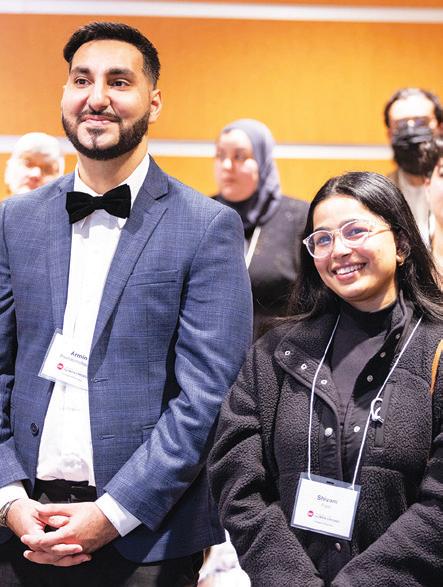
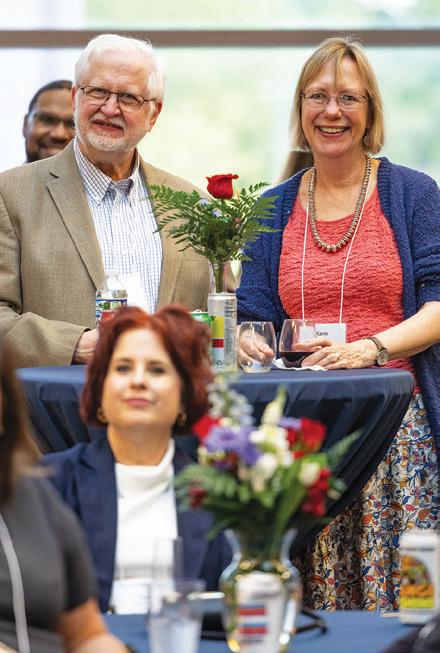
In May, the Rockford campus celebrated the 10th anniversary of its first graduating class of pharmacists. The campus opened in 2010 and awarded its first set of Doctor of Pharmacy degrees in 2014.
In addition to remarks from Dean Schumock and Vice Dean Rynn, guest speakers included Illinois state senator Steve Stadelman and Sandra Martell, head of the Winnebago County Health Department, who spoke about the Rockford campus’s positive impact on the state and local community.
“We enjoyed celebrating 10 years of graduates from our Rockford campus, and it was great to reconnect with alumni and friends of the college,” said Vice Dean Kevin Rynn.
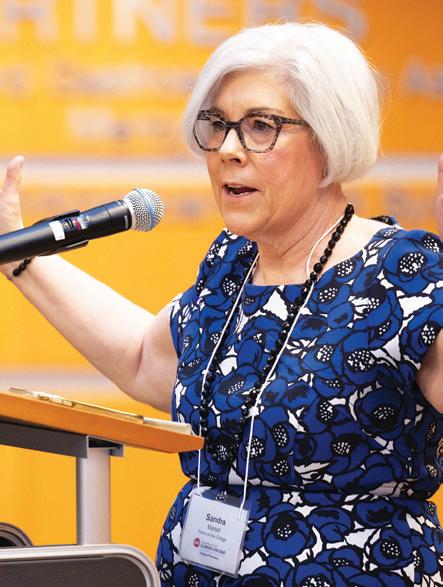
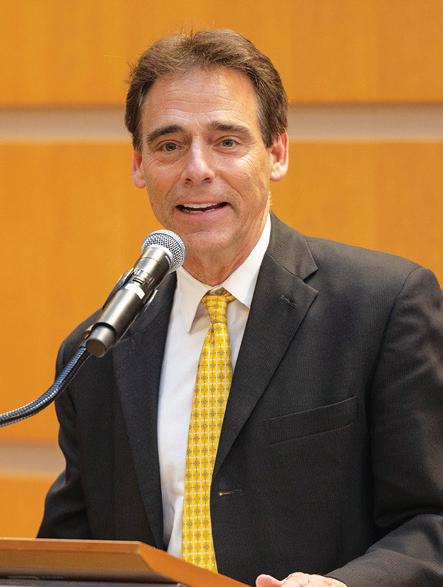
BY ROB MITCHUM
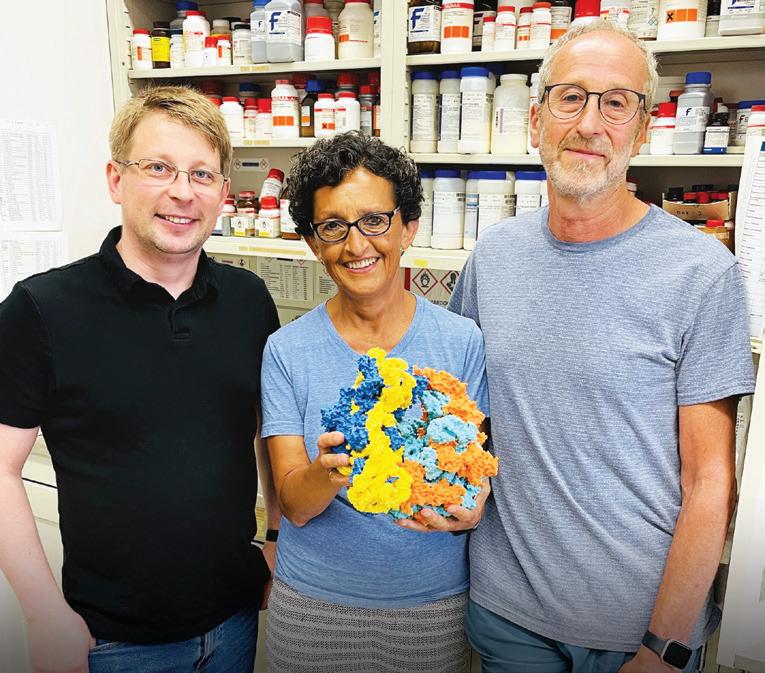
A new antibiotic that works by disrupting two different cellular targets would make it 100 million times more difficult for bacteria to evolve resistance, according to new research from the University of Illinois Chicago.
For a new paper in Nature Chemical Biology, researchers examined how a class of synthetic drugs called macrolones disrupt bacterial cell function to fight infectious diseases. Their experiments demonstrate that macrolones can work in two ways—by interfering with protein production or by corrupting DNA structure.
Because bacteria would need to implement defenses to both attacks simultaneously, the researchers calculated that drug resistance is nearly impossible.
“The beauty of this antibiotic is that it kills through two different targets in bacteria,” said Alexander Mankin, distinguished professor of pharmaceutical sciences at UIC. “If the antibiotic hits both targets at the same concentration, then the bacteria lose their ability to become resistant via acquisition of random mutations in any of the two targets.”
Macrolones are synthetic antibiotics that combine the structures of two widely used antibiotics with different mechanisms. Macrolides, such as erythromycin, block the ribosome, the protein-manufacturing factories of the cell. Fluoroquinolones, such as ciprofloxacin, target a bacteria-specific enzyme called DNA gyrase.
Two UIC laboratories led by Yury Polikanov, associate professor of biological sciences; Mankin; and Nora Vázquez-Laslop, research professor of pharmacy, examined the cellular activity of different macrolone drugs.
Polikanov’s group, which specializes in structural biology, studied how these drugs interact with the ribosome and found that they bind more tightly than traditional macrolides. The macrolones were even capable of binding and blocking ribosomes from macrolide-resistant bacterial strains and failed to trigger the activation of resistance genes.
Other experiments tested whether the macrolone drugs preferentially inhibited the ribosome or the DNA gyrase enzymes at various doses. While many designs were better at blocking one target or another, one that interfered with both at its lowest effective dose stood out as the most promising candidate.
“By basically hitting two targets at the same concentration, the advantage is that you make it almost impossible for the bacteria to easily come up with a simple genetic defense,” Polikanov said.
The study also reflects the interdisciplinary collaboration at the UIC Molecular Biology Research Building, where researchers from the Colleges of Medicine, Pharmacy and Liberal Arts and Sciences share neighboring laboratories and drive basic science discoveries like this one, the authors said.
“The main outcome from all of this work is the understanding of how we need to go forward,” Mankin said. “And the understanding that we’re giving to chemists is that you need to optimize these macrolones to hit both targets.”
In addition to Mankin, Polikanov, and Vázquez-Laslop, UIC coauthors on the paper include Elena Aleksandrova, Dorota Klepacki, and Faezeh Alizadeh.
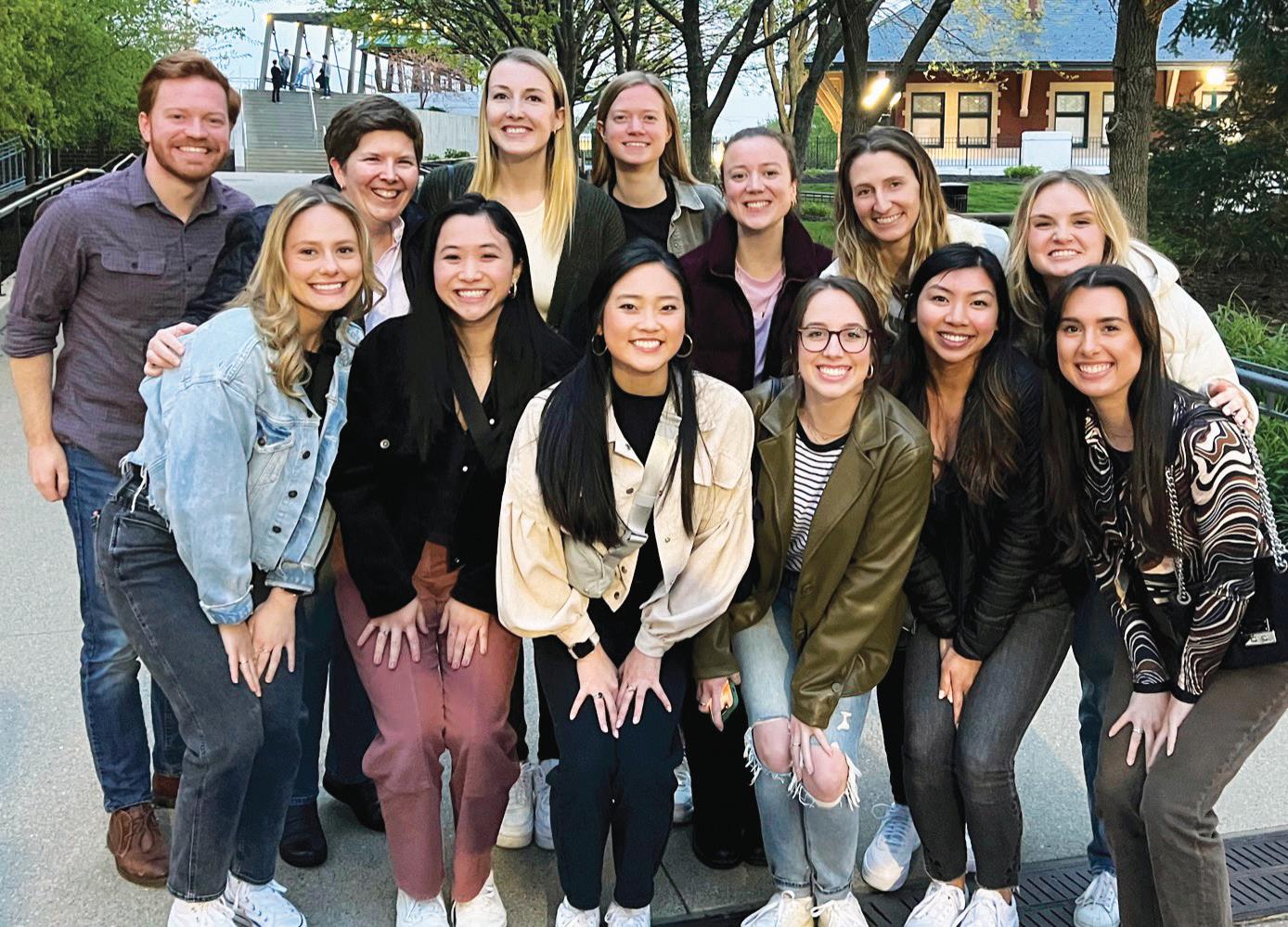
UIC Retzky College of Pharmacy is celebrating 55 years of its residency and fellowship programs, making the programs among the largest, oldest, and most comprehensive postgraduate training programs in the United States. Since 1969, UIC has granted 1,060 certificates to 919 residents and fellows and currently offers 25 PGY1, PGY2, and fellowship programs with 38 positions.
With this celebration comes the launch of a new program, Residency Village, which will connect UIC residency and fellowship alumni with current UIC residents and fellows for networking, resources, and general career guidance.
This program allows the vast international network of UIC residency and fellowship alumni to give back to UIC through Residency Village. Their expertise and connections will help prepare current UIC residents and fellows for long term career success.
A major strength of the UIC residency and fellowship programs is the prominence of internationally known faculty who leverage practice, research, and teaching in a robust academic environment to prepare residents and fellows for a lifetime of learning, leadership, and career success. Over the years, nearly 100 faculty served as residency and fellowship directors or codirectors.
If you are an alumnus of the UIC residency and fellowship programs, we want you to join our Residency Village! To learn more about Residency Village and sign up, visit our website at go.uic.edu/ResidencyVillage
MITUL AMIN , PharmD ’13, entered a new role as formulary operations manager at Capital Rx.
SCOTT V. ANDERSON , PharmD ’1 0, was honored as a fellow of the Virginia Society of Health-System Pharmacists in March and is the new director of member relations for the Section of Pharmacy Informatics and Technology at ASHP.
ZACHARY BANNOR , PharmD ’17, started a new position as a delivery solutions architect at Databricks.
ELIZABETH BENTLEY, PharmD ’1 1, begins a new position as director of pharmacy quality at Kaiser Permanente.
WILLIAM W. CHAN , PharmD ’07, has begun a new position as administrative director at Stanford Health.
JASON CHUNG , PharmD ’22, is now global program regulatory manager at Novartis.
SHANNON GONIWIECHA , PharmD ’22, started a new position at Dana-Farber Cancer Institute as a GI oncology clinical pharmacy specialist.
VIKAS GUPTA , PharmD ’89, started a new position as senior director of clinical pharmacy at Blue Health Intelligence.
LIL HERRERA , PharmD ’18, began a new position as a district support pharmacy leader at CVS Health.
DEANNA HORNER , PGY1 ’08, started a new position as senior vice president and chief pharmacy officer at Waltz Health.
MICHELLE KELLER , PharmD ’05, began a new position as clinical research pharmacy services manager at Amgen.
AARON KIRKWOOD, PharmD ’06, began a new role as pharmacy director at Amerita, Inc.
ERNEST LAW, PhD ’18, started a new role as a senior director, HV&E team lead, Litfulo & Velsipity, at Pfizer.
DONNY LEE , PharmD ’20, starts a new position as assistant scientific director of U.S. medical affairs, oncology, at AbbVie.
INYOUNG LEE , PharmD ’21, has begun her position as associate director, HEOR, at AbbVie.
ALICIA LICHVAR , a former faculty member, started a new role at the University of California, Irvine, as a transplant pharmacist specialist.
RENEE MCALISTER , PharmD ’15, is now oncology medical science liaison, associate director of radiogland therapy, at Novartis.
ANDY MCINERNEY, PharmD ’21, begins work in a new role as emergency medicine clinical pharmacy specialist at Advocate Lutheran General Hospital.
SONAM PATEL , PharmD ’16, started a new role at UCI Health as an oncology investigational drug service pharmacist.
SUNNY PATEL , PharmD ’21, started a new position as an infusion clinical pharmacist at UT Southwestern Medical Center.
LAUREN PRATT, PharmD ’20, started a new position as an inpatient cardiology clinical pharmacy specialist at Parkland Health.
STEVEN WOODS , PharmD ’95, takes up a new position as HEOR lead and medical liaison at Catalyst Pharmaceuticals, Inc. What has changed in your life? PLEASE LET US KNOW AT GO.UIC.EDU/ ALUMNIUPDATE
SAM HONG , PharmD ’19, started as global head of health economics and outcomes research at Agilent Technologies.
KABIR OYENUGA , PharmD ’1 1, commenced a new position as district leader at CVS Health.
PRITI PAREKH , PharmD ’01, began a new position as market access and reimbursement regional manager for the Patient Navigator team at Syneos Health.
CHRISTOPHER SAFFORE , PhD ’19, initiates a new role as director of international HEOR strategy, RINVOQ Psoriatic Arthritis, Axial Spondylarthritis, Systemic Lupus Erythematosus, and SKYRIZI Psoriatic Arthritis, at AbbVie.
SAMANTHA SOCCO, PharmD ’20, has been promoted to senior medical science liaison at GeneSight.
KIM SPENCER , PharmD ’03, was mentioned in the American Healthcare Leader article “Kim Spencer’s Culture of Care at SSM Health.”
EDWARD STOIA , PharmD ’18, is now principal medical science liaison at Ferring Pharmaceuticals.
KELLY VALLA , PharmD ’09, has obtained a new position as associate director of scientific affairs at PRIME Education.
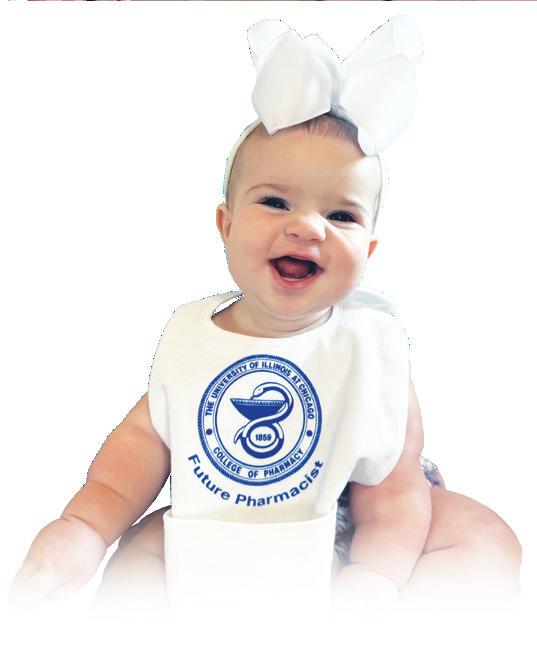
RALPH E. BERGGEN , Class of 1952, passed on July 7, 2024. Ralph was 96 years of age and a resident of Yakima, Washington.
COLLEEN M. BRADLEY, Class of 2021, passed on June 20, 2024. Colleen was 51 years of age and a resident of Wilmette, Illinois.
DONALD C. FLYNN , Class of 1954, passed on January 31, 2024. Donald was 93 years of age and a resident of Orland Park, Illinois.
MEGAN KRZAN
husband Chris welcomed their third Charlotte Krzan, on January 9, 2024. She joins big brother Cole (6) and big sister Callie (4).
LEXI BETCHER
of development, and husband Joe welcomed Reese Marlee Betcher on May 2, 2024. She joins big brother Griffin.

STEVEN W. MENDELEWSKI , Class of 1969, passed on April 4, 2024. Steven was 78 years of age and a resident of Western Springs, Illinois.
GLENN R. SCHERRER , Class of 1973, passed on March 8, 2024. Glenn was 73 years of age and a resident of Libertyville, Illinois.
BARBARA M. (DUDEK)
SCHUETTER , Class of 1961, passed on November 1, 2023. Barbara was 84 years of age and a resident of Park Ridge, Illinois.
HARVEY S. TENENBLATT, Class of 1958, passed on February 3, 2024. Harvey was 87 years of age and a resident of Tampa, Florida.
JAMES C. WICKLUND , Class of 1969, passed on January 22, 2024. James was 78 years of age and a resident of Rockford, Illinois.

Avery Louis Spunt (1947–2024), pillar of the Illinois pharmacy community and professor, mentor, and friend of many in the college, passed away on May 6, 2024.
Avery was both a faithful alumnus (BS Pharm 1970) and dedicated clinician and faculty member of the college. He was hired in 1972, initially as a pharmacist at the University of Illinois Hospital (then called the University of Illinois Research and Education Hospital). Avery was part of pioneering efforts to build clinical pharmacy at UIC, and he was involved in establishing the unit dose system for patients and eventually developed his own clinical pharmacy service in neurology and neurosurgery.
After completing a master’s degree in education, Avery took on other roles within the College of Pharmacy, including leading the experiential education program. In 1991, he was appointed the assistant head of pharmacy practice. He retired from UIC in 2002 after 31 years of service.
While he had a second career after UIC and was a significant contributor to pharmacy education and practice across Illinois and the United States, he was always an important part of the UIC COP family.

“Avery and his wife Janet Spunt (BS Nursing 1974, MS Nursing 1983) took every opportunity to participate in events and support the college. His dedication and contributions to UIC—our students and trainees and his colleagues on the faculty and staff—will not be forgotten,” says Dean Schumock.
“Avery’s work on developing and refining school-supervised experiential sites was remarkable,” said dean emeritus Henri Manasse (UIC BSPharm 1968). “His work occurred at a time when the curriculum was changed to allow for more than a year of clerkships. It was a significant challenge to line up sites and preceptors, but Avery persevered to provide quality experiences for students. This early work led by Avery set the pace for future development of standards and best practices for site-based education.
Dean emeritus Jerry Bauman (UIC BSPharm 1976) recalls, “Avery was first my teacher as a student, then my colleague on faculty, and last my assistant head for education and director of experiential education in the Department of Pharmacy Practice. In each role, I relied heavily on his wise and gentle
counsel. I wasn’t the only one by far. Avery mentored and aided thousands of pharmacy students from both UIC and then later Midwestern after he retired from UIC. To say he was important to pharmacy in Illinois would be a gross understatement. He was one of the very best individuals that I have ever known; we have lost a great pharmacist and friend.”
“Avery wanted to be a pharmacist since he was 16 years old working in the local drug store and was mentored by the pharmacist he worked with,” says his wife Jan. “He pursued his career at UIC. After completing his service in the Marine Corps he went to work at UI Hospital, starting in the old hospital and then EEI and NPI. Boy, did he have stories to tell! Soon after, he worked as a clinical pharmacist in neurology. He loved taking care of both his patients and students! In 1982, I met Avery when we both worked on the 8th floor, so UIC had even more special meaning for us. I know Avery would like to be remembered for the impact he made with his patients and students. He also did a wonderful job as husband, father, and friend. Avery cared deeply about people and we all felt that in our interactions with him!”

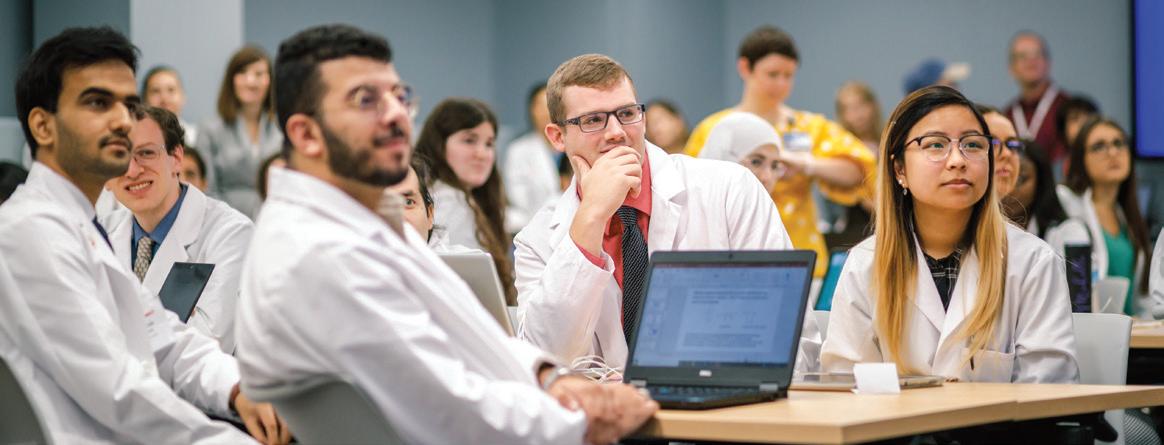
The Retzky College of Pharmacy will match 50% or 100% of your contribution when you invest in the Legacy Scholarship Program with a gift that meets the following requirements:
Contribute $50,000 and the college will make a 50% match on your scholarship gift.
Contribute $100,000 to $1 million and the college will make a 100% match on your scholarship gift.
Gifts must support merit- or need-based recruitment scholarships in the college.
Donor(s) may add one additional preferred criterion (e.g., degree program, department, or geographic location).
Qualifying gifts may be pledged but must be fully paid within five years to remain eligible.
ALREADY HAVE AN ENDOWED A SCHOLARSHIP WITH THE COLLEGE?
If you are willing to update the scholarship criteria to that of the Legacy Scholars program, you can qualify for the match for additions to your existing scholarship.
WHAT HAPPENS AFTER FULL FUNDING?
Once fully funded, scholarships may be named as [donor(s) preferred name] Legacy Scholarship, and student recipients will be known as Legacy Scholars.
For any questions about this scholarship program and gifts to the college, please contact senior director of development Derrick Collins at dmc22@uic.edu or call
833

The University of Illinois Chicago Retzky College of Pharmacy cordially invites you to attend a private reception hosted by Dean Glen Schumock during the ASHP Midyear Clinical Meeting and Exhibition.
During this event we will celebrate two major milestones: our college’s 165th anniversary of its founding and the 55th anniversary of its residency and fellowship programs.
SUNDAY · DECEMBER 8, 2024 · 6–8PM
HILTON NEW ORLEANS RIVERSIDE 2 POYDRAS STREET / NEW ORLEANS / LOUISIANA